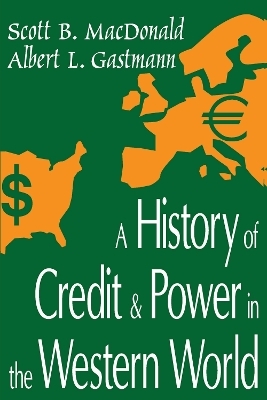The end of the Cold War put the planet on a new track, abruptly replacing the familiar world of bipolarity, red phones, and intercontinental ballistic missiles with the strange new world of the Internet, e-commerce, and Palm Pilots. The "New World Order" was defined by a U.S.-led war against Iraq, bloody ethnic strife in Bosnia and Rwanda, and religious turmoil in Central Asia. This evolving global system, however, overlooked the powerful role of credit, which functions as a critical building block for developing greater national and individual wealth. This volume examines the evolution of credit in the Western world and its relationship to power. Spanning several centuries of human endeavor. it focuses on Western Europe and the United States and also considers how the Western system became the global credit system. Six major themes run throughout: (1) the direct relationship between credit and power; (2) different kinds of political power promote different kinds of economic behavior; (3) various societal and cultural groups were often more successful in mingling credit and political power; (4) the Western credit system evolved in tandem with the development of the nation-state; (5) historically, there has been a pattern of financial crises; (6) credit spread from being the privilege of the wealthy and powerful to being available to vast numbers. MacDonald and Gastmann have broken history into five periods, ranging from early pre-modern, defining the earliest references to banking and credit as exemplified by the Code of Hammurabi, circa 1726 BC, through the Roman Empire with its creation of money and growing use of credit in trade, the barbarian invasions of the 11th century which led to a breakdown in credit networks in the West, through the establishment of the Italian city-states, to the modern period which incorporates the rise of credit in the Low Countries in the 1500s and extends through the rise of London and New York as the major international credit hubs. The final period is the global one which began in the early 1990s, reflecting the linkages of almost all points of the map, and the deepening democratization of credit in North America, Europe, and parts of Asia. This highly accessible and well-written volume will engage historians and economists alike.
Scott B. MacDonald is director of research at Aladdin Capital Holdings, Inc. Albert L. Gastmann taught political science, international law, comparative government, international politics, and Caribbean and Latin American politics at Trinity College in Hartford, Connecticut.
1: Introduction; 1: Introduction; 2: Early Pre-Modern Credit Period; 2: The Ancient Mediterranean World; 3: Byzantine Christians and Muslims; 4: The Jewish Bridge; 3: Early Modern Credit Period; 5: Trade Fairs and The Knights Templar; 6: The Italians and Credit; 4: Modern Credit Period; 7: Credit Goes North: The Road to Amsterdam; 8: Finance in the Age of British Power; 9: Continental Echoes; 10: The Rise of U.S. Power and Credit; 11: The Democratization of Credit; 12: Challenges to the U.S.-Dominated Credit System; 13: Globalized Markets; 14: Conclusion: New Frontiers



